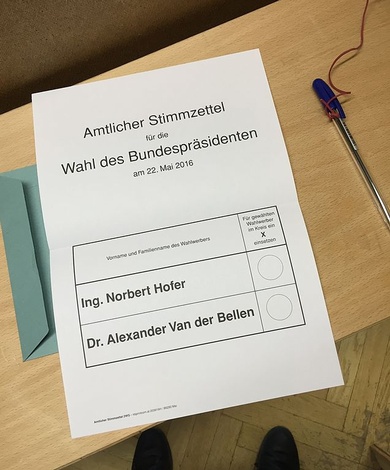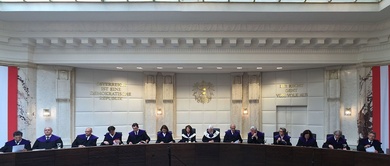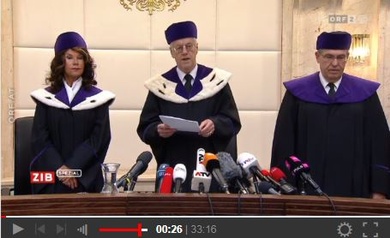In the public hearing on the challenge against the 22 May 2016 run-off election of the federal president, which was held by the Constitutional Court and lasted several days, the witnesses, one after another, made statements that, taken together, provided an overall picture. In the end, the Constitutional Court judges came to the conclusion that the rules for counting the postal votes had been violated in 14 Austrian electoral constituencies. This concerned around 77,000 votes – a number large enough for the irregularities to potentially influence the election result. In line with its long-standing jurisprudence, the Constitutional Court therefore had to repeal the election. A second reason for the repeal was the fact that partial results had been communicated to the media ahead of time. Even though this had been common practice for decades, the question had never been referred to the Constitutional Court before.
In 2016, the Austrian population elected a new federal president. Norbert Hofer and Alexander Van der Bellen obtained the highest numbers of votes in the first round of the election, held on 24 April 2016, and were therefore the candidates in the run-off election held on 22 May 2016. In this second round, Van der Bellen obtained 50.3% of the votes cast, thus winning by a narrow margin. After the announcement of the official election results by the Minister of the Interior, the defeated candidate’s legal representative authorised to accept service filed an electoral challenge pursuant to Art.141 para.1 point (a) of the Constitution with the Constitutional Court. This challenge was based primarily on alleged procedural errors in the handling of postal ballots on the part of numerous district electoral authorities all over Austria.
The Constitutional Court then conducted comprehensive investigation proceedings, including the public hearing of oral evidence from 90 witnesses from all provinces. Given that sect.21 para.2, first sentence, of the Law Governing the Election of the Federal President requires a decision on an electoral challenge to be made within four weeks, the Constitutional Court was under considerable time pressure in view of the large number of evidence hearings. On 1 July 2016, Constitutional Court President Holzinger orally announced the decision, W I 6/2016 (VfSlg 20.071). For the first time in history, the oral announcement was broadcast live on television by the Austrian Broadcasting Corporation (ORF).
The electoral challenge was allowed. The proceedings before the Constitutional Court had revealed that in 14 Austrian electoral constituencies, the constitutional principle of secret voting as well as provisions of the Law Governing the Election of the Federal President had been violated when establishing the result of postal voting. The purpose of these provisions is to preclude manipulation and abuse in the electoral process. In this case, it was determined that postal ballots had been opened by unauthorised persons or earlier than permitted under election rules. The established illegalities concerned approximately 77,000 votes. As the difference in votes between the two candidates was only around 30,000 votes, the infringement was substantial enough to potentially influence the election result.
The decision to repeal the run-off election was in line with the strict jurisprudence applied for decades. The Constitutional Court’s practice has always been to repeal elections if a violation of legal provisions aimed at precluding abuse and manipulation has been proven and the number of votes concerned was large enough for the violations to have potentially influenced the election result. In such cases, it has been the practice of the Court to repeal the election without speculating whether the violations of the law have actually resulted in manipulation. In the case of the election of the federal president, the repeal had to be nationwide, given that – unlike National Council elections or Provincial Parliament elections – postal ballots in this type of election are not allocated to the electoral constituencies of the voters. Therefore, in the case of a partial repeal, it could not have been excluded that some voters would not have been able to cast their votes at all while others would have been able to cast their votes twice.
The second reason for repealing the election was that the Ministry of the Interior had passed on information about the election results to the media and market research institutes prior to the close of the elections. The Constitutional Court found this practice to be in breach of the principle of “free elections” and the requirement of “purity of elections”. The purpose of such rules is to ensure that the result of the election reflects the true will of the electorate. Partial results had been passed on ahead of time for decades, but had never been the subject matter of an electoral challenge, so that the practice could not have been dealt with by the Constitutional Court before. This problem has been exacerbated primarily by modern communication possibilities through social media. If media reports on presumed close runs in elections are quickly disseminated, they may have an influence on voting behaviour.
The run-off election was held again on 4 December 2016: Alexander Van der Bellen was elected Federal President with 53.8% of the votes cast. The first date set for the repeat election at the beginning of October had had to be postponed due to the fact that defective glue had been used in the production of ballots for postal voting.



